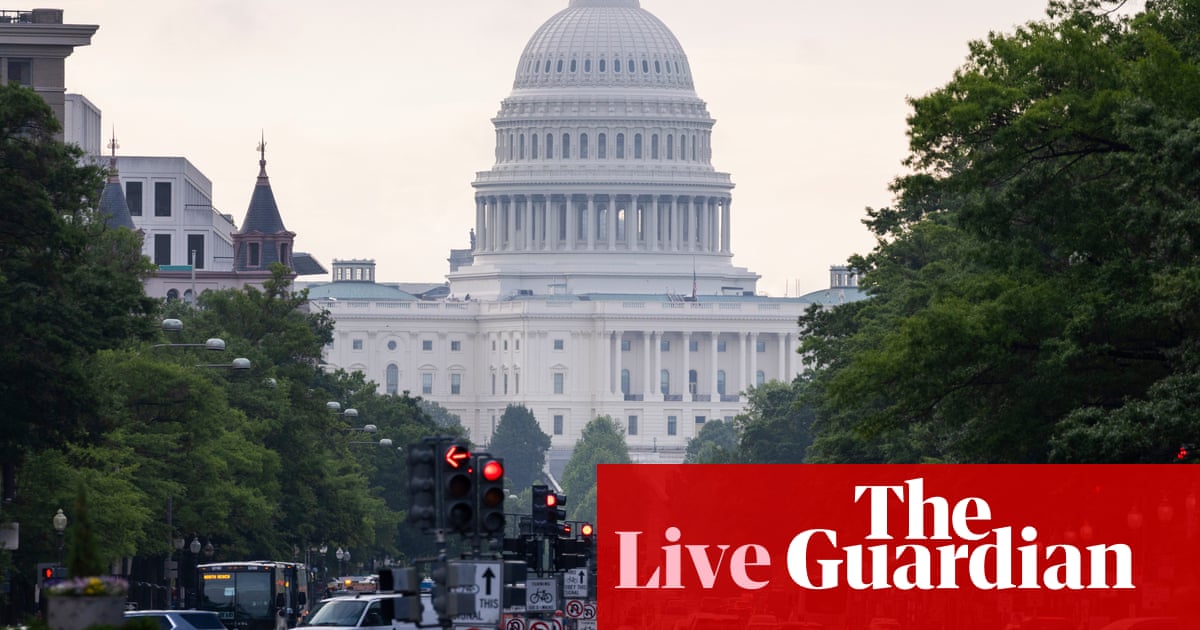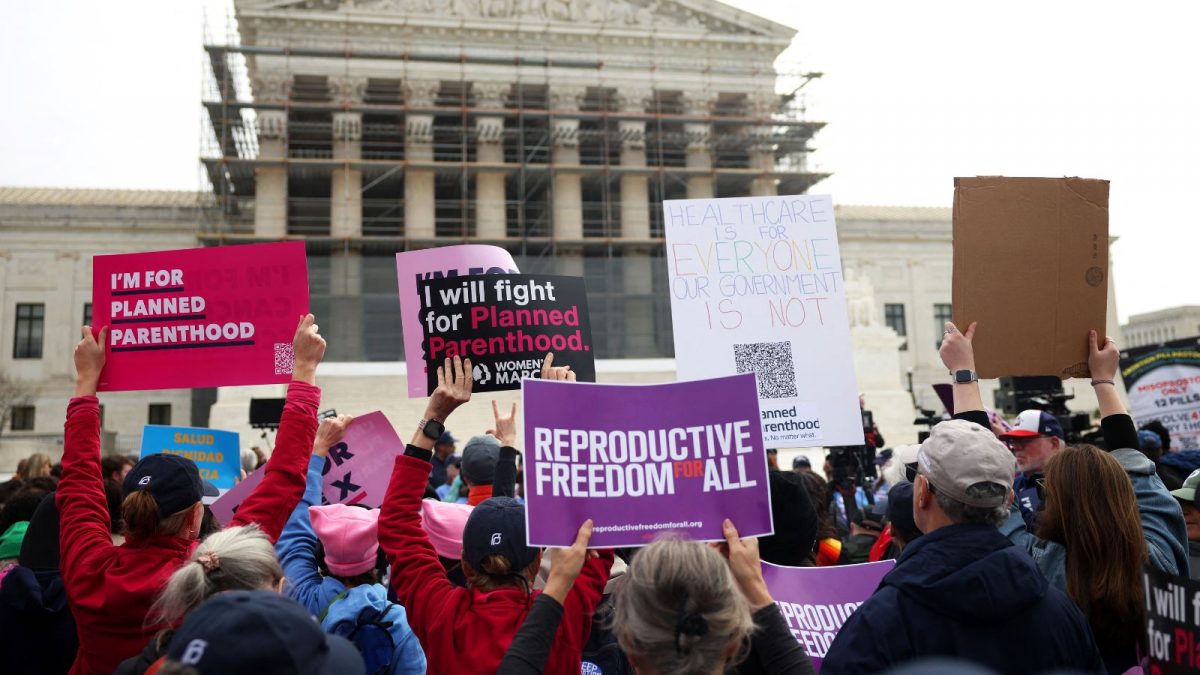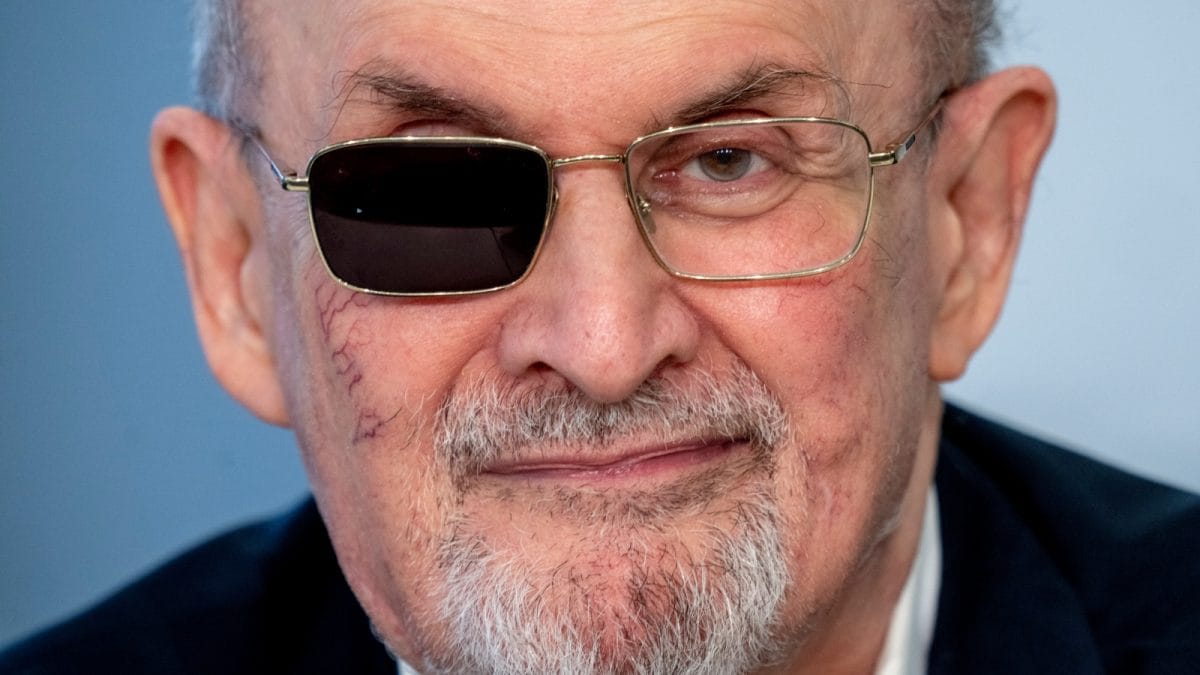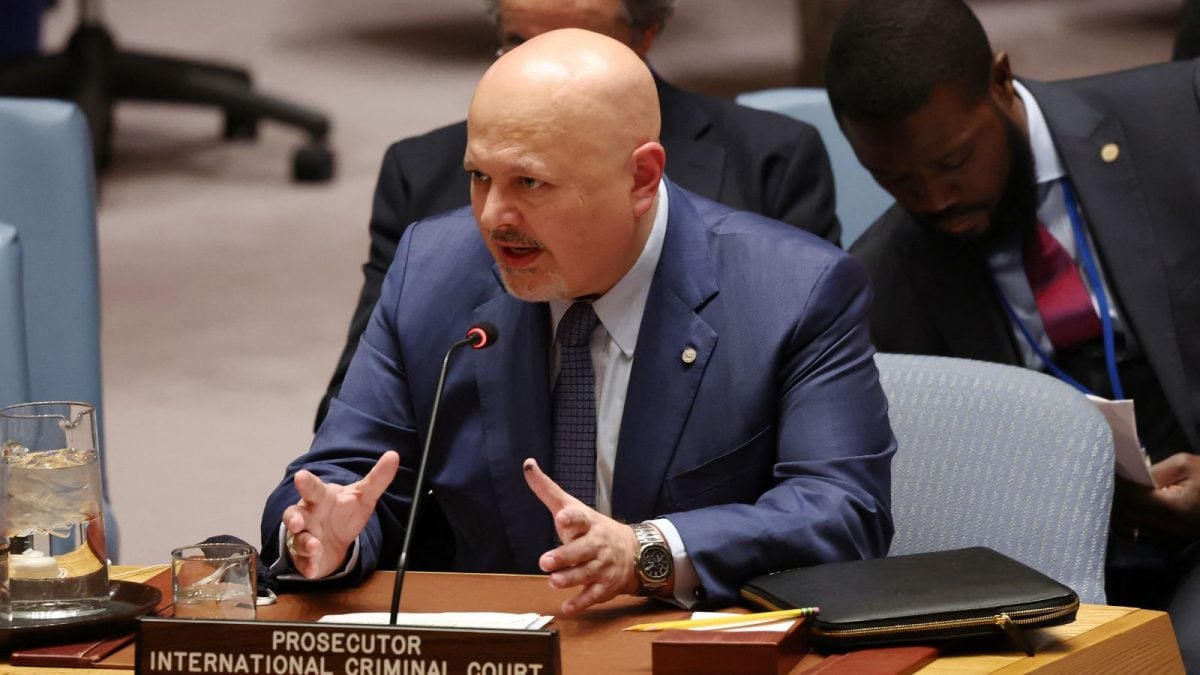Rantzen accused of being 'disrespectful' after suggesting critics of assisted dying motivated by undeclared religious views
Hoyle called Kim Leadbeater, the Labour MP who has introduced the bill, to open the debate.
Leadbeater started with some general points about the changes to the bill in committee, but Hoyle intervened and asked her to speak specifically about the amendments.
The Labour MPs Jess Asato intervened to ask Leadbeater if she would disassociate herself from what she said was Esther Rantzen’s “distasteful and disrespectful” about opponents of the bill being motivated by undeclared religious beliefs. (See 9.20am.)
Leadbeater claimed that she had not seen those comments. But she said that it was important that, whatever people’s views in this debate, “we must remain respectful”.
Key events Show key events only Please turn on JavaScript to use this feature
MP hits back at Rantzen, saying it's 'insulting' to dismisses valid concerns about bill as due to religious beliefs
In his speech Florence Eshalomi also hit back at Esther Rantzen over her letter (see 9.53am) in which she said critics of the bill were motivated by undeclared religious views. Eshalomi said:
As politicians, we have to be clear that members with valid concerns about this bill are not raising it because of some ideology or religious belief. It is because we recognise that if this bill passes, it may impact everyone, not just those who may choose to die.
It is not wrong or scaremongering to consider the wider family life, relationships, with feelings of burden or coercion, including vulnerable women and people from the BME community, at the end of their life.
It is not wrong or scaremongering for us as politicians, as we continue to receive correspondence from our constituents about the broken state about NHS and social care, for us to think carefully about a bill which may alter the very relationship between doctors and their patients.
And it is frankly insulting to disabled people, hard-working professionals up and down the country who have raised many valid concerns about this bill, to have it dismissed as “religious beliefs”.
I’ve sadly come to the conclusion that, instead of giving the universal right to dignity and death, it will reinforce the health inequalities that deprive so many from our vulnerable communities of that dignity in life.
Minority communities 'scared' about being more at risk of coercion under assisted dying bill, MPs told
One of the most powerful speeches in the debate so far was delivered by the Labour MP Florence Eshalomi, who is opposed to the bill. She said that she voted against the bill because she was worried about its “inadequate safeguards against the coercion of minority communities”.
She said that she hoped these concerns would be addressed by changes to the bill in committee, but she said she was “even more worried now” about the bill than she was last year.
She said she has tabled amendment 16, which would make it clear that care homes do not have to offer assisted dying. She said that Kim Leadbeater has tabled new clause 10 (NC10) saying people cannot be compelled to take part in assisted dying procedures (see 10.22am), but she said she she did not think this was comprehensive enough.
Explaining why she was worried about the impact of the bill on minority communities, she quoted from evidence given to the bill committee by Dr Jamelia Hussain, a palliative care consultant working predominantly with ethnic minority communities in Bradford. Hussain told the MPs:
I have gone into those communities, and I’ve spoken to them about this bill, what they say, overwhelmingly to me, is we are scared. We are really fearful that this is going to result in disproportionate impact on our community. We’ve seen this through Covid, and we are scared.
Heartbreakingly, she also said, “almost every week, one of the first things I have to reassure patients about is that I cannot legally do anything to shorten their lives. This is front and centre of the fear of those patients, and we see it all the time.
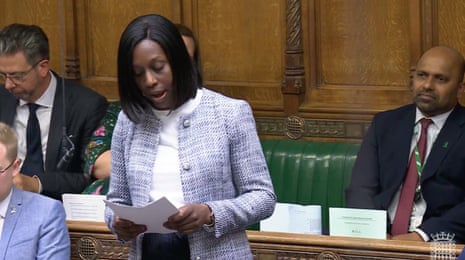
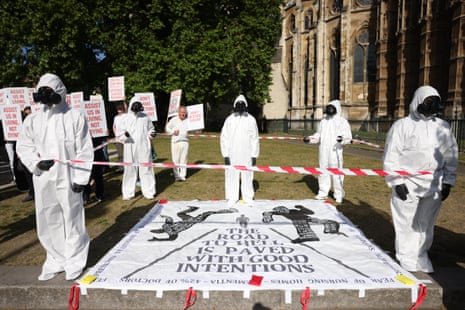
Edward Leigh (Con), father of the Commons (its longest-serving MP), used his speech in the debate to argue for care homes to be excluded from assisted dying.
Leigh quoted at length from the manager of a care home in his constituency who drafted a message for MPs on this subject. The care home manager said:
Imagine that pressure on those workers in that care home, the scenario is made worse by the prospect of an assisted death not resulting in a quick, nor painless death. There are examples from other jurisdictions of significant complications leading to painful deaths and deeply traumatic experiences for loved ones.
We ask this House of Commons to consider the unworkable nature of individual exclusion from the processes of assisted dying in social care environments.
Consequently, specific exclusion of the care home sector should be a feature of the bill. In any case, organisations and sites should and must be given the ability to exclude themselves from the act of assisted death.
Muslims are three times as likely to oppose the assisted dying bill as non-Muslims, according to new polling published this week by Hyphen, a Muslim media platform.
In her report on what Hyphen describes as the first comprehehensive study of Muslim views on assisted dying, Aisha Rimi says:
Some 43% of Muslims surveyed by Savanta in late February and early March said they were against the terminally ill adults (end of life) bill, compared with 15% of non-Muslims. About a fifth (19%) of Christians said they opposed the bill, along with 15% of followers of other religions and 8% of non-religious people.
About a third (34%) of Muslims said they backed the bill, compared with more than two-thirds (69%) of non-Muslims as a whole, including 64% of Christians. The rest did not know or did not hold a view in either direction.
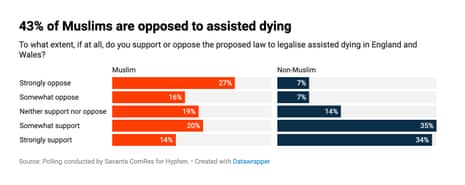
Anneliese Dodds, the Labour former development minister, told MPs that she was worried about people feeling under pressure to end their lives via assisted dying. Dodds, who voted against the bill at second reading, said:
I have heard countless times the phrase that I do not want to be a burden. I’ve heard that time and again.
James Cleverly, the former Tory foreign secretary, intervened, asking Dodds what she thought about “the impact of intersectionality” on this. He said:
We know that a number of people don’t, in practical terms, have full control over their lives. [Diane Abbott] the mother of the house, made the point [see 11.25am] about people particularly from ethnic minorities, particularly women from ethnic minorities, who are often pushed around by their families, their wider society will be particularly at risk from the gentle advice or suggestions from authority figures that they will be overly deferential towards and in doing so lead them, I think, into a very dangerous position.
Dodds said she agreed.
I further believe that it is exactly those individuals who would be more likely to be subject to coercion from others. And I’m afraid that the evidence does indicate that, we can see that sadly when it comes to the experience of our courts from so-called mercy killings.
I do believe it’s instructive that in those cases we’ve had highly trained legal professionals who’ve often described the actions, particularly of former partners, as motivated by compassion. But then when the circumstances have been investigated in detail we’ve seen evidence of substantial amounts of coercion and abuse.
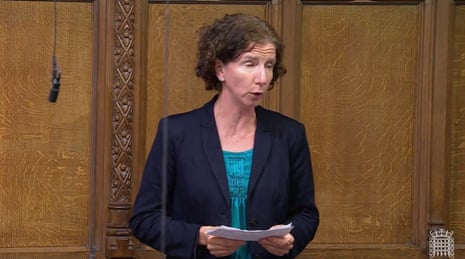
The Labour MP Meg Hillier, who voted against the bill at second reading, has tabled an amendment to the bill (new clause 1, or NC1) banning doctors from rasing assisted dying with a patient unless they asks about it first. She said she thought this was necessary because the bill as drafted “presents a serious risk that terminally-ill patients already highly vulnerable will feel pressured into ending their lives”.
Diane Abbott (Lab), another opponent of the bill, made an intervention to say she agreed. She asked
Does [Hillier] agree with me that there are far too many people who do not have confidence in the face of authority, and if a doctor raises assisted suicide with them, however tactfully or professionally, they will feel that they are being steered in that direction?
And Caroline Johnson (Con), another opponent of the bill, backed Hillier too, saying:
I’m very aware as a doctor myself of the trust that the public place in doctors, and the seriousness with which they take what we say. If a doctor tells somebody, or gives any information, about assisted dying, it is quite reasonable for that person to think that either the doctor is suggesting that they should take part in this process, or even they’re hinting their death is going to be a dreadful one and trying to be kind to them.
Assisted dying bill underwent 'massive shift' in committee, with more emphasis on choice, MP claims
The second speaker in the assisted dying bill debate was Rebecca Paul (Con), who voted against the bill at second reading and who has tabled NC10(a). (See 10.22am.) She sat on the committee that considered the bill and she said the changes to the bill since November amounted to a “massive shift”.
She explained:
The arguments put forward changed. There was less emphasis on pain and more on choice and autonomy. The word autonomy came up again and again in the bill committee, and autonomy is important, of course, but up to a point.
We have moved from a proposal to provide a humane end to someone’s pain when it can’t be relieved in the last months of their life to providing an assisted death service to those who choose it for any reason even if the pain can be alleviated by palliative care. But this approach comes with a cost to others – family, clinicians and broader society.
This really is momentous. There is no going back from such a massive shift. A move to autonomy trumping everything else changes everything.
In an intervention, John Hayes (Con) said he agreed:
Other jurisdictions who have passed laws like this, up to a third of people report that they’ve taken this step because they feel they’re a burden on others. That’s the truth of it. It’s not always about pain and that’s the kind of autonomy which leads to disaster.
Paul said she “strongly” backed the Naz Shah amendment on anorexia (see 10.59am) saying “it addresses a big risk”.
She also said she had tabled two other amendments (new clause 17, NC17, and new clause 18, NC18), saying care homes should not have to offer assisted dying, and that they should not lose public money as a result of not offering assisted dying.
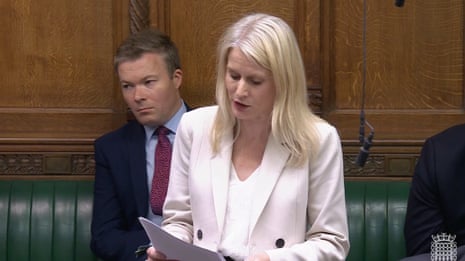
Turning away from assisted dying for a moment, Keir Starmer has said the UK-EU summit on Monday will be “an important moment” for the country.
Speaking to reporters as he arrived for the European Political Community summit in Albania, he said:
In the last two weeks you’ve seen the UK do a trade deal with India, really important for our country and our national interest, a trade deal with the US, again really important for our country and our national interest.
I’m positive going into Monday and I think that this is an important moment for our country that will be measured in the benefits to working people and their living standards.
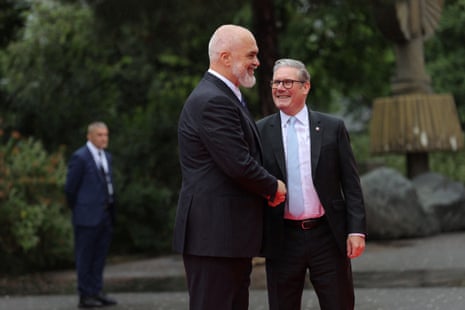
Leadbeater says risk of people being able to qualify for assisted dying as result of anorexia 'negligible'
One of the amendments to the bill being debated today has been tabled by the Labour MP Naz Shah, who voted against the bill at second reading. Her amendment 14 would tighten the bill so that anyone not terminally ill cannot qualify as terminally ill (meaning they can use assisted dying) “by voluntarily stopping eating or drinking or both”.
In her speech Leadbeater said that she could understand the concerns behind Shah’s amendment, but that she thought the risk of anyone being able to qualify for assisted dying as a result of anorexia was “negligible”. She said:
Not only would someone with severe anorexia be highly unlikely to be assessed to have capacity to make a decision about assisted dying, the other tragic reality is that if a patient was so ill as a result of not eating and drinking for whatever reason, they would die before the process of assisted dying would be able to take place.
I know that some people have expressed concerns that the severe physical consequences of a decision to stop eating or drinking could still enable someone to claim eligibility for assisted dying when otherwise they would not be able to do so, and I believe that is the motivation behind this amendment … As I’ve set out, I think that risk is negligible.
Leadbeater suggested she was not opposed in principle to the Shah amendment. But she said there was some concern “that clinicians might have difficulty in assessing with certainty that the decision to stop eating and drinking was the only reason for a person’s terminal prognosis”, and that the amendment might have to be reworded for it to be passed by the Lords.
The Labour MP Allison Gardner asked Leadbeater about the Royal College of Psychiatrists saying it cannot support the bill in its current form. She said:
The Royal College of Psychiatrists have stated that they do not feel at the moment in time there are sufficient psychiatrists who would be able to deliver that position on such a panel. What response does the member have to that?
Leadbeater said there are around 4,500 psychiatrists in the country, and that the number of people using assisted dying in the early years would be “very small”.
Kim Leadbeater rejects claim assisted dying will would allow people to 'shop around' until they find doctor willing to approve request
In her opening speech, Kim Leadbeater set out the reasons for her amendments, including NC12, which says if a doctor refuses an assisted dying application, they should produce a report saying why. (See 10.22am.)
This prompted some MPs to ask her about the risk of people “shopping around” until they found a doctor willing to agree their request.
Labour’s Polly Billington asked:
There is nothing currently in the bill that would ensure that if the person made another request in the future, the next co-ordinating doctor will be made aware of that doctor’s report. Can she say anything to reassure those of us with concerns that people who are suffering from mental ill health, including depression, may seek assistance repeatedly until they find a doctor who will assess them as eligible?
Leadbeater said this would not be a problem because “copies of the report would be given to the patient and to the co-ordinating doctor if they were not in that GP’s practice, but also to the commissioner as well, so that information would be recorded”.
Desmond Swayne (Con) asked:
The bill does allow applicants to shop around for doctors and it strikes me that there is a danger that some doctors will specialise in the provision of that service, who might have an ideological view of this bill, giving it a far greater scope than she intends.
Leadbeater replied:
I reject the assertion that patients will shop around, bearing in mind we are talking about dying people, they’re not in a position to start shopping around for services.
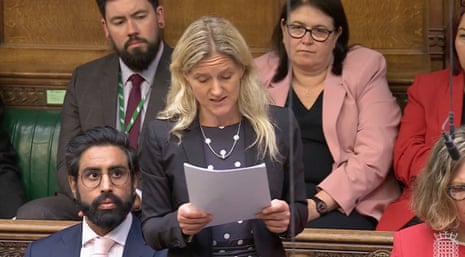


What amendments to assisted dying bill are likely to be put to a vote today?
Most of the amendments tabled and being debated today will not be put to a vote. (That is normal in the Commons; there is not time to vote on everything, which is why the Speaker gets to decide what does go to a vote.)
Some amendments will be called. But that does not necessarily mean there will be divisions. It is possible they could all be approved by acclamation (MPs in favour shouting aye, with few, if any MPs objecting), which means we could get to the end of the day without any new voting numbers.
The first vote today will be on Kim Leadbeater’s new clause 10 (NC10).
This is intended to beef up guarantees that doctors cannot be forced to take part in assisted dying procedures if they do not want to. In her explanation of the amendment, Leadbeater says:
This new clause, intended to replace clause 28, expands the protection currently provided by that clause by broadening the persons to whom it applies and the functions to which it relates; and it introduces NS1 which makes provision for enforcement of the right not be subject to detriment in connection with the bill.
If this is passed, the Speaker will call a vote on Rebecca Paul’s amendment to this amendment – NC10(a). Paul, a Conservative, voted against the bill at second reading. Her amendment would ensure that employers opposed to assisted dying can also stop their employees providing assisted dying services. In her explanation of it, Paul says:
This amendment ensures that employees who work for an employer who had chosen not to provide assisted dying cannot do so whilst working for that employer.
Supporters of the bill expect the Speaker to allow votes on two further amendments – both tabled by Leadbeater.
One is new clause 11 (NC11). This sets out the procedure for what would happen if the doctor who had approved an assisted dying request backs out and needs to be replaced. In her explanation of this, Leadbeater says:
This new clause makes provision about the replacement ofthe coordinating doctor orthe independent doctor where the doctor is unable or unwilling to continue to carry out their functions under the bill.
And the other is new clause 12 (NC12). This says that, if the coordinating doctors thinks assisted dying should not go ahead, he or she should produce a report saying why. In her explanation, Leadbeater says:
This new clause (intended to be inserted after Clause 27) requires the coordinating doctor to produce a report where assistance is not provided because they are not satisfied of all of the matters mentioned in Clause 23(5).
All of these amendments are seen as relatively uncontroversial, and so even opponents of the bill may be happy to see them go through on the nod.
If there are divisions, they may start around 1.45pm, because voting has to end by 2.30pm.
Rantzen accused of being 'disrespectful' after suggesting critics of assisted dying motivated by undeclared religious views
Hoyle called Kim Leadbeater, the Labour MP who has introduced the bill, to open the debate.
Leadbeater started with some general points about the changes to the bill in committee, but Hoyle intervened and asked her to speak specifically about the amendments.
The Labour MPs Jess Asato intervened to ask Leadbeater if she would disassociate herself from what she said was Esther Rantzen’s “distasteful and disrespectful” about opponents of the bill being motivated by undeclared religious beliefs. (See 9.20am.)
Leadbeater claimed that she had not seen those comments. But she said that it was important that, whatever people’s views in this debate, “we must remain respectful”.
Lindsay Hoyle, the Commons Speaker, started by saying he was minded to call (ie, put to a vote) Kim Leadbeater’s new clause 10 (NC10). If that is passed, he said he would call Rebecca Paul’s NC10(a), an amendment to NC10.
He said there are more than 90 MPs who want to speak. He said during private member’s bill debate time timits on speeches do not normally get imposed, but he urged MPs to keep speeches to within 15 minutes to begin with. That guidance might change later, he said.
The debate is starting.
At the start an MP moved a motion that the house sit in private. During debates on private member’s bills, opponents of bill sometimes use this procedure (which triggers a vote which, if passed, means MPs continue sitting with the public and press excluded) because it holds up proceedings, and because it establishes how many MPs are in parliament to vote. Because this has become such an established wrecking procedure, supporters of bills now move that the house sits in private at the start of debates because, when that has been tried once during proceedings, it cannot be tried again.
Lindsay Hoyle, the Speaker, took the vote by acclamation. Overwhelmingly MPs shouted no (ie, they were opposed to sitting in private), and so there was no divison. The proceedings moved on.
MPs debate assisted dying for first time since November, following 150 changes to bill in committee
Good morning. Today MPs will spend five hours debating the assisted dying bill, or the terminally ill adults (end of life) bill, to give it its proper title. The legislation, which covers England and Wales, was passed at second reading in November by 330 votes to 275 – a majority of 55. That does not mean it will definitely become law, because the third reading vote in the Commons will not take place until next month. But, although a few MPs have changed their minds, there is no evidence that opponents of the bill are now close to having a majority.
After the debate in November, the bill went to a committee where MPs debated around 500 amendments to it, and voted in favour of about 150 of them. That means the legislation on the table today is not the same as the bill debated last year. The Commons library has produced a good briefing paper with a guide to the main changes. There is a 179-page document here listing all the amendments that were agreed. Here is the text of the bill as amended.
Now the bill is back in the Commons chamber all MPs can submit amendments and dozens of them have been tabled. You can read them all here. The Speaker has decided to group the amendments, so amendments that cover the same topics get debated at the same time, and the grouping list, with the selection of lead amendments (the ones most likely to be put to a vote) is here.
Today MPs will be debating the amendments in group one, covering “obligations, duties and protections for medical practitioners, hospices and care homes, the procedure for receiving assistance under the Act including safeguards and protections, eligibility and mental capacity”.
We are expecting some votes this afternoon but nothing that would sabotage the bill. From what gets said, we may get a slightly better indication as to how likely the bill is to pass at third reading but the crucial votes are coming on another day. Today won’t decide the future of what is widely seen as a landmark piece of legislation that would change the law in this country fundamentally. But it will provide some sort of progress report on how it is doing.
As the Guardian reports, Esther Rantzen has urged all MPs in an open letter to back Kim Leadbeater’s “strong, safe, carefully considered” private member’s bill ahead of today’s debate.
But Rantzen’s letter says some opponents of the bill are motivated by “undeclared personal religious beliefs which mean no precautions would satisfy them”, and this has angered some MPs who voted against it at second reading.
The Labour MPs Jess Asato posted this comment about the letter on social media.
This was a particularly distasteful letter. Disrespectful to those with faith and without. Condescending to disabled people. And dismissive of professionals who work day in day out to provide the care people who need at the end of life.
Asato’s tweet was reposted by Wes Streeting, the health secretary, who liked Asato is also opposed to the bill.
We will be covering the debate in detail today, but there is other politics happening too. Here is the agenda for the day.
9.30am: MPs start their debate on the assisted dying bill. It will run until 2.30pm.
9.45am: Keir Starmer is due to arrive at the European Political Community summit in Tirana, Albania. He is giving a speech in the morning session, and also holding bilateral meetings with fellow European leaders. After the summit wraps up, he is due to brief the media.
Lunchtime: Kemi Badenoch speaks at the Welsh Conservative conference in north Wales.
If you want to contact me, please post a message below the line when comments are open (normally between 10am and 3pm at the moment), or message me on social media. I can’t read all the messages BTL, but if you put “Andrew” in a message aimed at me, I am more likely to see it because I search for posts containing that word.
If you want to flag something up urgently, it is best to use social media. You can reach me on Bluesky at @andrewsparrowgdn.bsky.social. The Guardian has given up posting from its official accounts on X but individual Guardian journalists are there, I still have my account, and if you message me there at @AndrewSparrow, I will see it and respond if necessary.
I find it very helpful when readers point out mistakes, even minor typos. No error is too small to correct. And I find your questions very interesting too. I can’t promise to reply to them all, but I will try to reply to as many as I can, either BTL or sometimes in the blog.

 10 hours ago
10 hours ago





